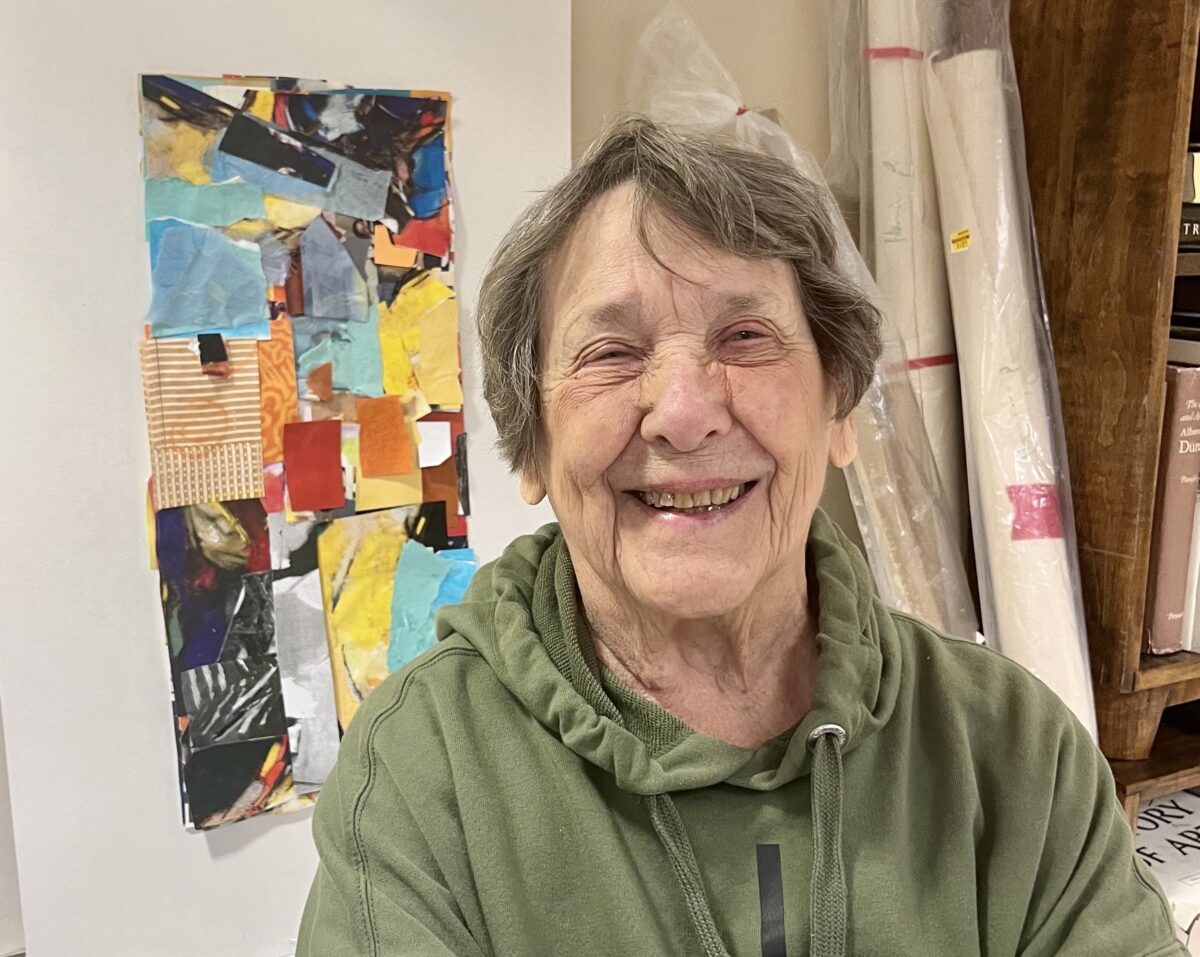Shortly before she died of ovarian cancer, Susan Murdock said to her husband, “You will not be a hermit. You will not be a recluse.”
He remembers this time well. Ten months after her death, Larry Murdock moved in 2017 to the Granville location of Otterbein, a retirement community formerly known as Kendal at Granville on the southwest side of the village. As high school sweethearts, the Murdocks had been married for 53 years.
Now 74, Larry says he keeps his promise to Susan every day by being active in the Otterbein and Granville communities. The retired Denison University registrar has been weaving since 1978 and has a studio in his home at Otterbein where he keeps his loom. He’s a member of the local Presbyterian church and former president of the senior community’s residents’ association. He also sits on its gallery committee, a group of residents responsible for hanging works by local artists in a hallway on campus. (Pieces are replaced every two months.)
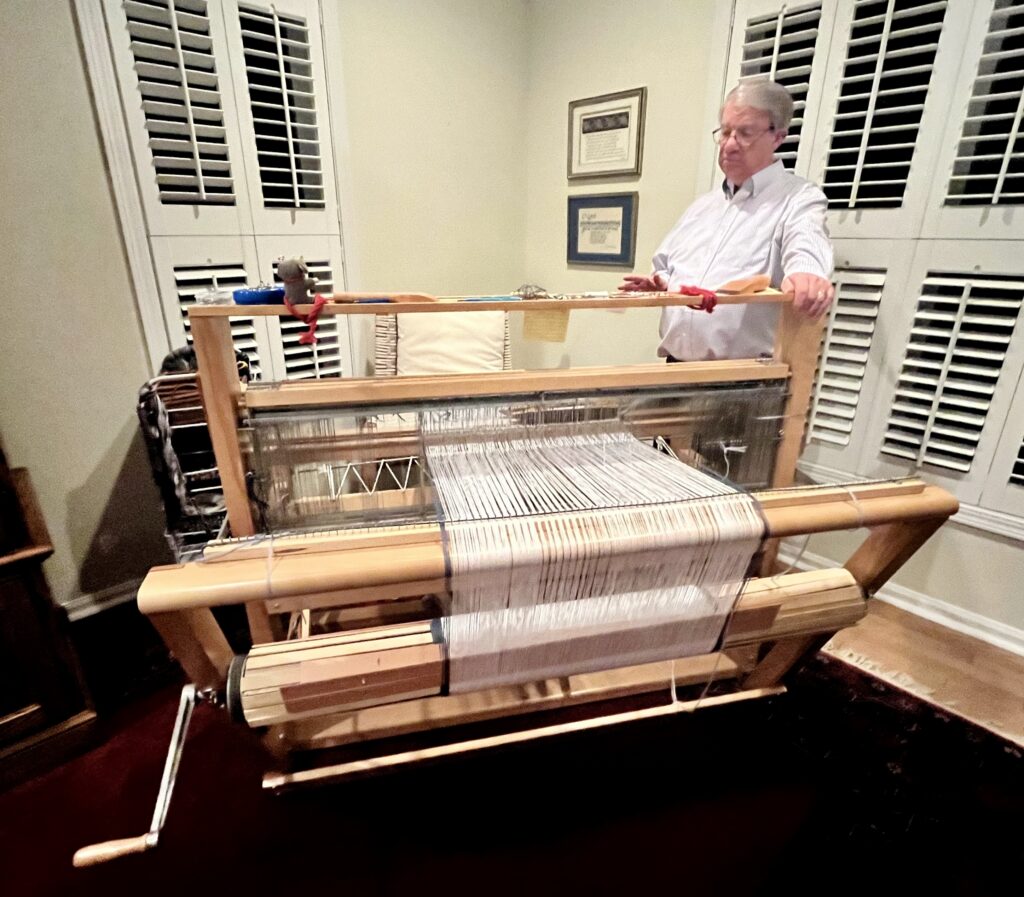
“It’s a very stimulating environment in many ways,” Larry said of Otterbein. “If you have an interest and there isn’t already a group with that interest, find another person or two, and you’ve got a committee, you’ve got a program.”
At Otterbein, residents decide what they do and when they do it. Every club or organization has been started by a resident, and residents describe that autonomy as a fulfilling aspect of their golden years.
“Whatever interest one has, just start asking, and there will be a friend with whom to share it,” one resident wrote on the community’s blog.
Friendship is important, especially in this stage of life. Before the coronavirus pandemic, which has killed 790,000 American seniors, death was already an imminent reality in senior living facilities. Feelings of isolation came with the territory. More than a third of people aged 45 and older described feeling lonely and nearly a fourth of older adults are “socially isolated,” according to the Centers for Diseases Control and Prevention.
The community is close and adapts to the changes that aging brings by supporting one another. “In an experience like this, we lose friends almost monthly,” said one resident, David Skeen. “Those who are survivors are gathered around, and it’s not maudlin.”
Lining the perimeter of Larry’s weaving studio is a collection of stuffed sheep he’s gathered over the years. One of his favorites is a sheep with skis and red leg warmers that a student picked up from the Italian Alps. He said many were gifts “to thank me for some service I provided” during 37 years as registrar at Denison.
In 2016, Larry created a dedication to Susan on his loom. All three lines of music he weaved represent moments of Larry and Susan’s life together. The top line is from a piece commissioned in Susan’s honor when she retired after 32 years as a children’s choir director at the Presbyterian church. The church wanted to do something special for her after she died, so they called up her favorite children’s composer and asked if he’d compose a song to celebrate her years of service. The church paid for the commission of Susan’s song and also flew in the composer and his wife to perform live.
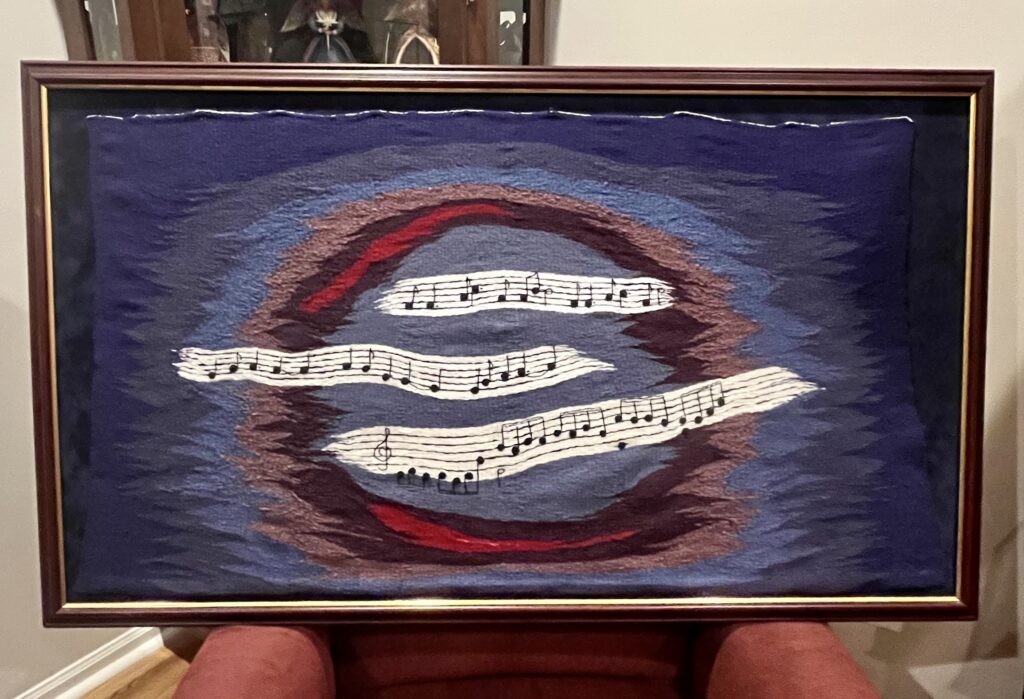
The second line of music is Leonard Cohen’s famous “Hallelujah.” Larry and Susan always adored the piece. The third is from an arrangement by composer Robert Schumann, an all time favorite of Susan’s.
“If people followed me around, they’d probably think, He’s crazy. He’s talking to this invisible person all the time,” Larry said. “I talk to Susan all the time. We were so connected in so many different ways.”
He wrote an article for the community magazine about how he still uses plural pronouns. “Even though she has gone physically, the we’s and the ours still make sense.” Larry said.
“In an experience like this, we lose friends almost monthly. Those who are survivors are gathered around, and it’s not maudlin.”
David Skeen, resident
“God was a baby when I was born,” said 95-year-old Jane Heller as she placed another piece on her ever-changing, multi-colored collage, her hands steady. The art studio at Otterbein is her domain. On a recent afternoon, she perched on a stool with wheels and rolled around to view her art from different perspectives. Without her, a studio space wouldn’t have been possible.
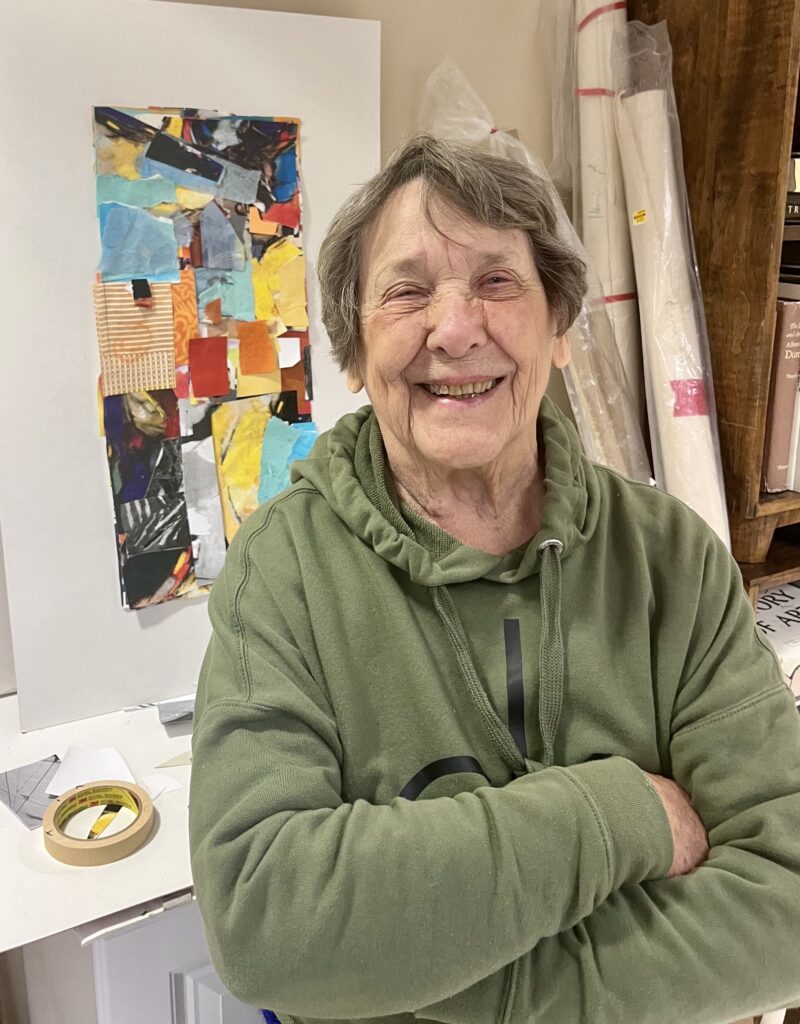
Jane and her husband, Jack, alongside David and Dee Richards — all Denison graduates of 1945 — founded the senior living community at Granville in 2004, now known as Otterbein. The Hellers both had aging parents they cared for. Her father died at 95 and his mother at 104.
“I’m chuckling because my mother died, and then my father, of course, married the housekeeper,” Jane said. “And she really didn’t like me until she got Alzheimer’s, and then she didn’t know who I was and became very fond of me.”
As Jane and Jack’s parents aged, traveling as a couple became nearly impossible. “The minute we would say something about it, one of the parents would fall through a plate glass door and hurt themselves,” Jane said. They had to cancel two trips to Europe and didn’t want their own kids to face the same hard decisions one day.
A senior living community was “our gift to them,” she added.
Many of Otterbein’s oldest residents have been part of pivotal points in history. Mary Ingham, who’s in her nineties, said she worked with Jonas Salk on the polio vaccine. Max Rabinovitsj, a world-class violinist and concertmaster, learned to play violin at 8 years old while in hiding from Nazi forces in Belgium, two years after they captured his father, he told the Port Clinton News Herald. The teacher was eventually captured as well, “but I found a way to continue to play,” Rabinovitsj told the paper in 2021.
A number of residents have deep connections to Denison University.
Every Tuesday morning at 8:30 sharp, David Skeen, 82, throws on a sweatshirt with the name of his alma mater and grabs breakfast with retired faculty and other locals at a dining hall on Denison’s campus. And David’s wife, Becky Skeen, who recently turned 82, is up shortly afterward for her morning water wellness class at the pool.
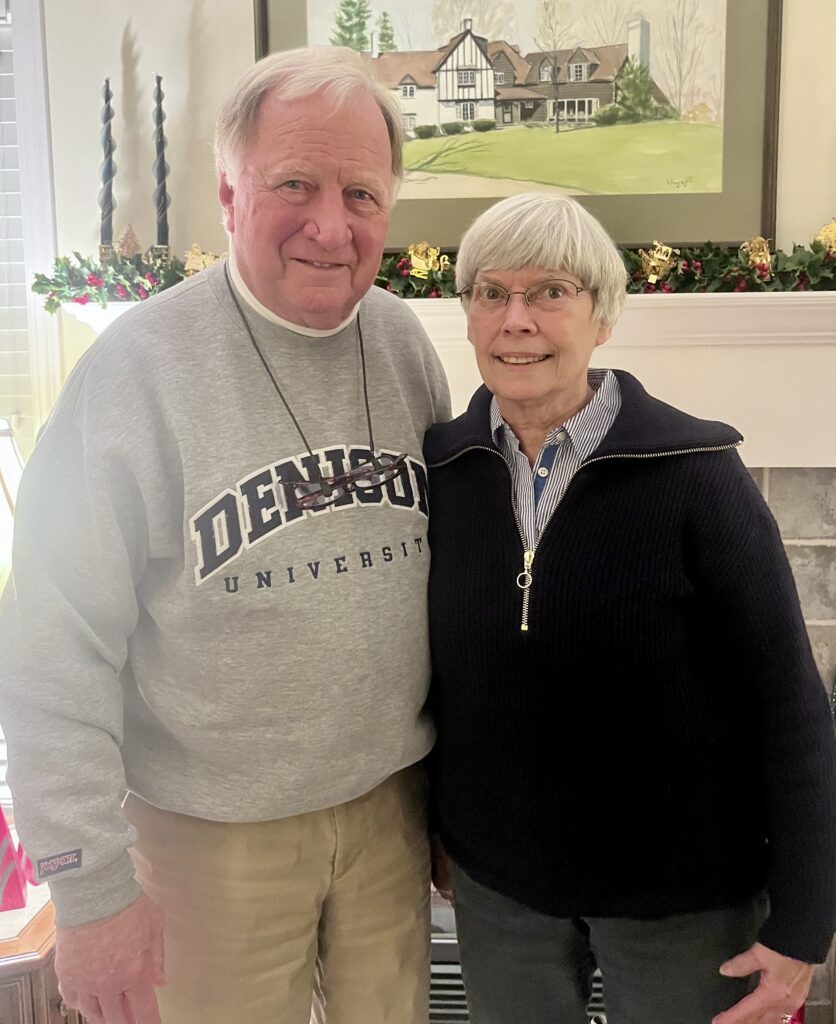
Every Tuesday and Thursday at 9:15 a.m., residents gather in the warm water of the indoor pool to push their limits. “We don’t shrink or fade! We do stretch and float,” one resident wrote about the water aerobics classes on Otterbein’s blog.
Becky echoed what her neighbors have said about the community. “The many activities are resident-driven,” Becky said. “Instead of everybody being herded to do the same things, we all have a say in what we want to do. Everybody’s very active.”
“We don’t have a director of activities,” David added. As Denison graduates of 1962, it was important to them that they remained in Granville to participate in the tight-knit community.
Becky and David’s days on the hill certainly aren’t over. David has taken three classes at Denison since they moved in 12 years ago. They’re both docents at the Granville Historical Society. David just retired as head of the Granville library’s board of trustees.
Christie Vargo, 70, originally moved to Columbus and led a capital campaign raising $14.5 million to build a conservation center downtown. Now called the Audubon Center, its mission is to protect birds and the places they need, today and tomorrow. They conserve and restore natural ecosystems, focusing on birds and their habitats. Christie served as the center’s director for five years.
In between the campaign and her time as director of Audubon, Christie went to work for the Girl Scouts, where she met her wife, Carol, now 86. They moved to Otterbein in February 2019. Christie gets to care for birds here, too. In fact, there are 38 nesting boxes scattered across the property that residents tend to. Otterbein’s campus is also an accredited Level 1 Arboretum with 95 species of trees.
Christie sits on the residence council and finds conversations with her neighbors to be refreshingly thoughtful. “People listen. And actually value listening to different opinions. And then take those different opinions and really noodle on them. That conversation, that back and forth, plays into really good decision making,” Christie said.
She enjoys taking photographs and has space to mat and frame them with a friend at a studio at Otterbein.
Christie is well-aware of the rare community she’s come across. “We’re all just so connected, and, because Otterbein is resident led, we all work together to make things happen. So we share meals together, you know, we play together, we run it. We know everybody’s name. It’s just amazing.”
Zoe Meyer writes for TheReportingProject.org, the nonprofit news organization of the Denison University Journalism Program, which is sponsored in part by the Mellon Foundation.

